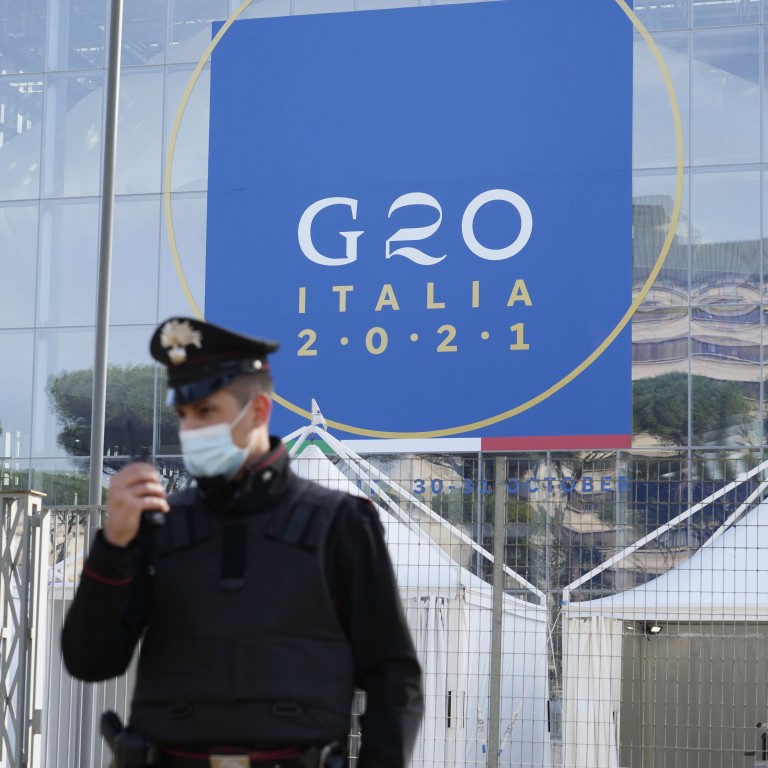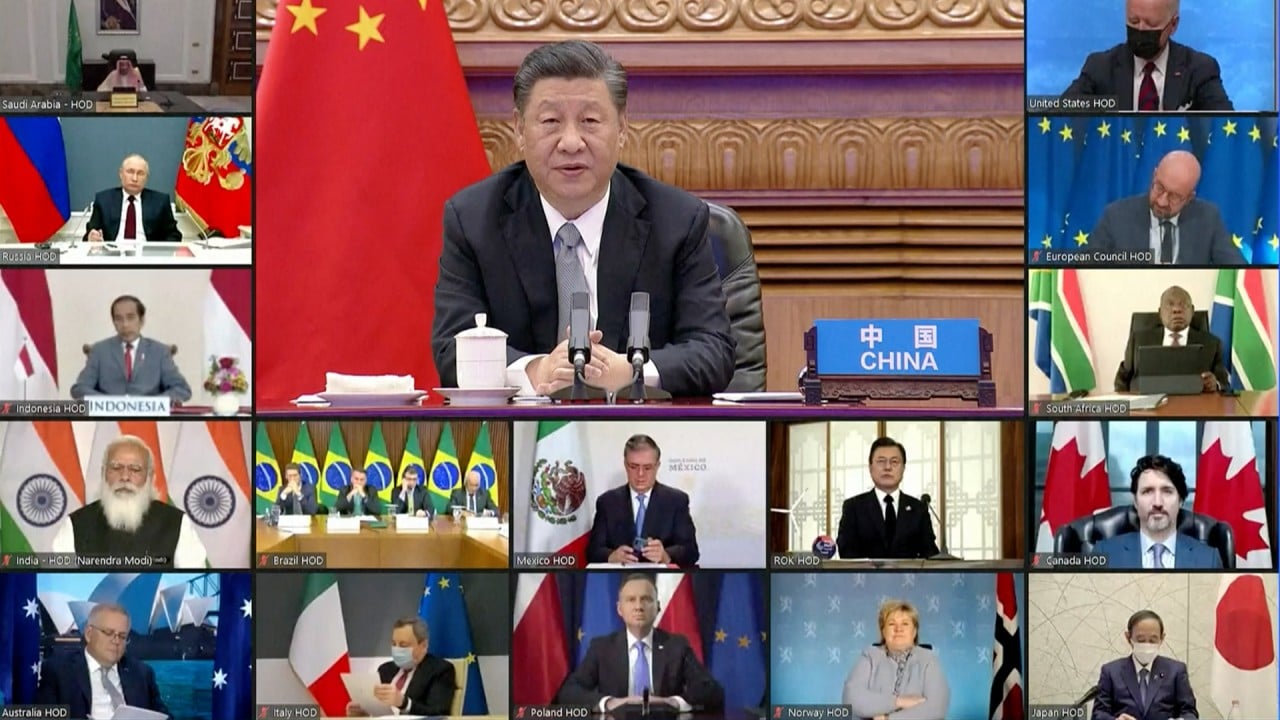
Will Xi and Putin’s absence make a difference to the G20 and climate change summits?
- Topics for discussion at the G20 in Rome include ending coal use, Covid-19 vaccine distribution, a global minimum corporate tax and rising energy prices
- An EU official doesn’t think the absence of Chinese President Xi Jinping will adversely affect the potential for deals
It is a four-day burst of high-stakes diplomacy in which the world’s most powerful leaders will haggle over crucial climate targets, global tax rates, clogged supply chains and vaccinating the planet.
But the build-up has been marked by the palace intrigue over who will attend and what the absence of key figures means for the complex issues at play.
Xi’s absence comes at a time of heightened tension between China and the United States, along with other G20 members, including Australia and to a lesser extent Britain, Canada and the European Union.

03:27
World leaders pledge to cut greenhouse emissions at virtual Earth Day summit
An EU official, speaking under the condition of anonymity, did not expect Xi’s absence to negatively affect the prospects of deals on everything from ending coal use and vaccine distribution to global minimum corporate tax and rising energy prices.
Both China and Russia have “very good negotiating teams here who are quite focused on what they need to achieve for their leaders”, the official said. “They are very active and making lots of comments and proposals, and certainly very much engaged in the process.”
Beijing has dispatched Foreign Minister Wang Yi instead, as was the case during emergency G20 talks on Afghanistan earlier this month.
Wang was expected be greeted in Rome on Friday by a counter-summit organised by the Inter-Parliamentary Alliance on China (IPAC), a transnational group of legislators demanding that the rest of the G20 adopt a tougher approach towards Beijing.
G20 countries’ policies make it difficult to attract green investment
The group delivered a replica of the Pillar of Shame to the Chinese embassy in Rome on Wednesday. The statue pays tribute to the victims of the bloody Tiananmen Square crackdown and Hong Kong University recently ordered its removal from campus.
Hong Kong, Uygur and Tibetan exiles planned to join lawmakers from Europe, Japan and Australia in an all-day shadow event on the eve of the G20. But Taiwanese Foreign Minister Joseph Wu, who was invited, will address the IPAC event by video link instead.
Wu has been on a whistle-stop tour of Europe – including a last-minute visit to Brussels, during which EU sources said he would not meet with top diplomat Josep Borrell but would meet other foreign service staff.
His presence would have led to the uncomfortable situation of the foreign ministers of the People’s Republic of China and the Republic of China being in the same European city at the same time.

But while the sideshow might prove a minor distraction, Wang will be under real pressure to deliver in the negotiating room.
Most Western participants – Australia excluded – are bringing forward their peak emissions and carbon neutrality targets, but China is expected to stick to its original goals of peak emissions by 2030 and carbon neutrality by 2060, said Shi Yinhong, an international relations expert at Renmin University and an adviser to China’s State Council.
“So China will be under great pressure on this issue, no matter who attends,” Shi said.
In a letter published by Italy’s National Associated Press Agency, China’s ambassador to Italy, Li Junhua, wrote that “China expects that the G20 Rome summit will adhere to true multilateralism, promote the spirit of partnership and send a positive signal on improving global governance”.
However, there were some dissenting voices in Rome when Xi bailed on the emergency meeting on Afghanistan a few weeks earlier, “a real true and unique opportunity to show this political will of using multilateralism as a main framework of global security crisis management”, said Teresa Coratella, programme manager at the Rome office of the European Council on Foreign Relations.
What is the Aukus alliance, and what does it have to do with China?
Analysts poured cold water, however, on the idea that no Xi would mean no deal on climate.
China is driven by self-interest in the area, said experts on a recent webinar on COP26 and China, and could also be spurred on by competition with rivals.
“The issue of reputation and legitimacy, I think that’s a real battle that’s on the minds of the senior Chinese leaders. They are making a case that their more top down approach to governance is, at minimum, as legitimate as Western democracies,” said Alex Wang, a law professor focused on the intersection of climate issues and US-China rivalry at UCLA, adding that this pressure means they “don’t want to wreck the COP”.
“And frankly, coming from the US, where democracy is not in the healthiest shape, American democracy needs a little bit of a jolt to show that it can really live up to its promise, so again this competition is not the worst thing in the world.”

Said Heather Conley, director of the Europe, Russia and Eurasia programme at the Centre for Strategic and International Studies (CSIS): “Hopefully there will be an elevation of French participation in the Indo-Pacific, something that because of how the Aukus announcement unfolded did really not allow us to give France an important role in the Indo-Pacific.”
French President Emmanuel Macron and Biden are set to meet on the sidelines of the event.
The Biden administration’s courting of the G20 both as a whole, and with individual members, strengthens the US position even if Xi were to attend in person, said Daniel Russel, who served as assistant secretary of state for East Asian and Pacific affairs under president Barack Obama.
US calls on UN members to support Taiwan participation
Russel, now vice-president of the Asia Society Policy Institute in New York, cited several key engagements – including the special G20 meeting on Afghanistan earlier this month – that will help Biden carry his agenda through in Rome.
That meeting resulted in what the White House called a “collective commitment to provide humanitarian assistance directly to the Afghan people” without lifting economic sanctions on the Taliban government or unfreezing and handing back billions of dollars of Afghan international assets.
China and Russia had called for the two latter measures against the wishes of Washington.
In addition, US Treasury Secretary Janet Yellen and Sri Mulyani Indrawati, her counterpart in Indonesia, which will host next year’s G20 summit, issued a statement this week calling for a forum on global coordination to fight the next pandemic and for a new financing facility to keep up with emerging public health threats.

Acknowledging “a lack of readiness at the country level and a lack of coordination among us” the two said the forum should allow health and finance ministers to more easily “begin the work of facilitating global cooperation and coordinating prevention, detection, information sharing and, if needed, response”.
“If Biden is making common cause with leaders in one of the world’s non-aligned emerging economies on Covid, that’s really an accomplishment,” Russel said, adding that the administration is seen as being more proactive compared to China and Russia.
Despite these strengths, Biden still faces obstacles, with the shadow of predecessor Donald Trump looming over these events.
EU agrees to go carbon-neutral by 2050 ahead of Biden climate summit
Russel described Trump’s behaviour at last year’s G20 as “operation piss off the world”, adding that the fact Trump retains influence over the Republican Party makes other leaders wary about committing too much to Washington’s agenda.
During a recent panel discussion hosted by the Atlantic Council, a policy planning adviser in the Trump-era State Department said Trump used international forums to “tout some of the economic successes domestically” and the US economic model compared with others.
Before Covid-19 pounded the US economy, said Amanda Rothschild, the Trump administration oversaw economic growth and employment rates that usually outpaced expectations.
“Today, Americans are hurting at the gas pump and in the grocery store, so perhaps President Biden doesn’t have as much leeway” to trumpet his economic stewardship, Rothschild said, adding that economic development is also an important G20 agenda item.

Even if Biden’s reputation for bringing polarised parties together to support his agenda will work for him in Rome despite domestic difficulties in recent months, as Russel suggested would be the case, the “true multilateralism” that Ambassador Li spoke of will be difficult to realise.
Speaking on the CSIS panel, Stephen Morrison, a senior vice-president at the think tank, said Biden’s challenge would be to prove that his proposals have more to do with economic health, pandemic relief and environmental sustainability than Washington’s competition with China.
“We’re dealing with a drift into a cold war confrontation with China, and that puts a puts a twist in the perceptions of what the US motivations are in all of these spheres,” he said.
Additional reporting by Liu Zhen


